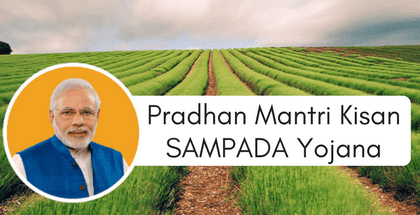A DESCRIPTIVE ANALYSIS ON PRADHAN MANTRI KISAN SAMPADA YOJANA
Dr Deeja.S
Assistant Lecturer, PG Department of Commerce, St. Gregorious College, Kottarakara
Volume No : 2
Issue No : 3

A strong and dynamic food processing sector plays a vital role in reduction in the wastage of perishable agricultural produce, enhancing shelf life of food products, ensuring value addition to agricultural produce, diversification &commercialization of agriculture, generation of employment, enhancing income of farmers and creating surplus for the export of agro & processed foods. In the era of economic liberalization, all segments including; private, public and co-operative sectors have defined roles to play and the Ministry promotes their active participation It. is a comprehensive package which aims to create modern infrastructure with efficient supply chain management from farm gate to retail outlet. It will not only provide a big boost to the growth of food processing sector in the country but also help in providing better returns to farmers and is a big step towards doubling of farmers income, creating huge employment opportunities especially in the rural areas, reducing wastage of agricultural produce, increasing the processing level and enhancing the export of the processed foods. The Ministry of Food Processing Industries has a clear goal of attaining these objectives by facilitating and acting as a catalyst to attract quality investments from within India and abroad into this sector with the aim of making food processing a national initiative. With this overall objective, the Ministry aims to: • Enhance farmer's income by better utilization and value addition of agricultural produce
• Minimize wastage at all stages in the food processing chain by the development of infrastructure for storage, transportation and processing of agro-food produce;
• Introduce of modern technology into the food processing industries from both domestic and external sources;
• Encourage R&D in food processing for product and process development and improved packaging;
• Provide policy support, and support for creation of Infrastructure, capacity expansion/ Upgradation and other supportive measures form the growth of this sectors;
• Promote export of processed food products.
PMKSY Scheme
Government of India (GOI) has approved a new Central Sector Scheme – Pradhan Mantri Kisan SAMPADA Yojana (Scheme for Agro-Marine Processing and Development of Agro-Processing Clusters) with an allocation of Rs. 6,000 crore for the period 2016-20 coterminous with the 14th Finance Commission cycle. The scheme will be implemented by Ministry of Food Processing Industries (MoFPI). Pradhan Mantri Kisan SAMPADA Yojan. PM Kisan SAMPADA Yojana is a comprehensive package which will result in creation of modern infrastructure with efficient supply chain management from farm gate to retail outlet. It will not only provide a big boost to the growth of food processing sector in the country but also help in providing better returns to farmers and is a big step towards doubling of farmers income, creating huge employment opportunities especially in the rural areas, reducing wastage of agricultural produce, increasing the processing level and enhancing the export of the processed foods. The following schemes will be implemented under PM Kisan SAMPADA Yojana : • Mega Food Parks
• Integrated Cold Chain and Value Addition Infrastructure
• Creation/ Expansion of Food Processing/ Preservation Capacities (Unit Scheme)
• Infrastructure for Agro-processing Clusters
• Creation of Backward and Forward Linkages
• Food Safety and Quality Assurance Infrastructure
• Human Resources and Institutions
• Operation Greens PM Kisan SAMPADA Yojana is expected to leverage investment of Rs. 31,400 crore for handling of 334 lakh MT agro-produce valued at Rs. 1,04,125 crore, benefiting 20 lakh farmers and generating 5,30,500 direct/indirect employment in the country by the year 2019-20.
Mega Food Park
The Scheme of Mega Food Park aims at providing a mechanism to link agricultural production to the market by bringing together farmers, processors and retailers so as to ensure maximizing value addition, minimizing wastage, increasing farmers income and creating employment opportunities particularly in rural sector. The Mega Food Park Scheme is based on “Cluster” approach and envisages creation of state of art support infrastructure in a well-defined agri / horticultural zone for setting up of modern food processing units in the industrial plots provided in the park with well-established supply chain. Mega food park typically consist of supply chain infrastructure including collection centers, primary processing centers, central processing centers, cold chain and around 25-30 fully developed plots for entrepreneurs to set up food processing units. The Mega Food Park project is implemented by a Special Purpose Vehicle (SPV) which is a Body Corporate registered under the Companies Act. State Government, State Government entities and Cooperatives are not required to form a separate SPV for implementation of Mega Food Park project. Subject to fulfillment of the conditions of the Scheme Guidelines, the funds are released to the SPVs. There are 37 Mega Food Parks in India among them 18 are operational.
Cold Chain
The objective of the Scheme of Cold Chain, Value Addition and Preservation Infrastructure is to provide integrated cold chain and preservation infrastructure facilities, without any break, from the farm gate to the consumer. It covers creation of infrastructure facility along the entire supply chain viz. pre-cooling, weighing, sorting, grading, waxing facilities at farm level, multi product/ multi temperature cold storage, CA storage, packing facility, IQF, blast freezing in the distribution hub and reefer vans, mobile cooling units for facilitating distribution of horticulture, organic produce, marine, dairy, meat and poultry etc. The scheme allows flexibility in project planning with special emphasis on creation of cold chain infrastructure at farm level. The integrated cold chain project is set up by Partnership / Proprietorship Firms, Companies, Corporations, Cooperatives, Self Help Groups (SHGs), Farmer Producer Organizations (FPOs), NGOs, Central / State PSUs, etc. subject to fulfilment of eligibility conditions of scheme guidelines
Creation/ Expansion of Food Processing/ Preservation Capacities (Unit Scheme)
The main objective of the Scheme is creation of processing and preservation capacities and modernisation/ expansion of existing food processing units with a view to increasing the level of processing, value addition leading to reduction of wastage. The processing activities undertaken by the individual units covers a wide range of post-harvest processes resulting in value addition and/or enhancing shelf life with specialized facilities required for preservation of perishables. While expansion of processing capacity is necessary to increase the level of processing and reduce wastage, the induction of modern technology is intended to make a clear difference in terms of process efficiencies as well as improving the quality of the end product. The setting up of new units and modernization/ expansion of existing units are covered under the scheme. Scheme is implemented through organizations such as Central & State PSUs/ Joint Ventures/ Farmer Producers Organization (FPOs)/ NGOs/ Cooperatives/ SHG’s/ Pvt. Ltd companies/ individuals proprietorship firms engaged in establishment/ upgradation/ modernization of food processing units.
Agro Processing Cluster
The scheme aims at development of modern infrastructure and common facilities to encourage group of entrepreneurs to set up food processing units based on cluster approach by linking groups of producers/ farmers to the processors and markets through well-equipped supply chain with modern infrastructure. Each agro processing clusters under the scheme have two basic components i.e. Basic Enabling Infrastructure (roads, water supply, power supply, drainage, ETP etc.), Core Infrastructure/ Common facilities (ware houses, cold storages, IQF, tetra pack, sorting, grading etc) and at least 5 food processing units with a minimum investment of Rs. 25 crore. The units are set up simultaneous along with creation of common infrastructure. At least 10 acres of land is required to be arranged either by purchase or on lease for at least 50 years for setting up of Agro Processing Cluster. To view Indicative list of identified agri-horti production clusters (fruits & vegetables) and visit Geo-Sampada on spread & depth of agri-resources
Scheme for Creation of Backward and Forward Linkages
The objective of the scheme is to provide effective and seamless backward and forward integration for processed food industry by plugging the gaps in supply chain in terms of availability of raw material and linkages with the market. Under the scheme, financial assistance is provided for setting up of primary processing centers/ collection centers at farm gate and modern retail outlets at the front end along with connectivity through insulated/ refrigerated transport. The Scheme is applicable to perishable horticulture and non-horticulture produce such as fruits, vegetables, dairy products, meat, poultry, fish, Ready to Cook Food Products, Honey, Coconut, Spices, Mushroom, Retails Shops for Perishable Food Products etc. The Scheme would enable linking of farmers to processors and the market for ensuring remunerative prices for agri produce. The scheme is implemented by agencies/ organizations such as Govt./ PSUs/ Joint Ventures/ NGOs/ Cooperatives/ SHGs / FPOs / Private Sector / individuals etc. The Ministry has engaged Technical Agencies(TAs) for assisting farmer/ producer groups including Farmer Producer Companies, Farmer Producer Organization, Self Help Groups to facilitate their participation under the Scheme. Food Safety & Quality Assurance Infrastructure
Quality and Food Safety have become competitive edge in the global market for food products. For the al round development of the food processing sector in the country, various aspect of Total Quality Management (TQM) such as quality control, quality system and quality assurance should operate in a horizontal fashion. Apart from this, in the interest of consumer safety and public health, there is a need to ensure that the quality food products manufactured and sold in the market meet the stringent parameters prescribed by the food safety regulator. Keeping in view the aforesaid objectives, government has been extending financial assistance under the scheme under the following components: • Setting Up/Up-gradation of Quality Control/Food Testing Laboratories
• HACCP/ ISO Standards/Food Safety/Quality Management Systems
Operation Greens
In the budget speech of Union Budget 2018-19, a new Scheme “Operation Greens” was announced on the line of “Operation Flood”, with an outlay of Rs.500 crore to promote Farmer Producers Organizations (FPOs #), agri-logistics, processing facilities and professional management. Accordingly, the Ministry has formulated a scheme for integrated development of Tomato, Onion and Potato (TOP) value chain.
Objectives:
• Enhancing value realisation of TOP farmers by targeted interventions to strengthen TOP production clusters and their FPOs, and linking/connecting them with the market.
• Price stabilisation for producers and consumers by proper production planning in the TOP clusters and introduction of dual use varieties.
• Reduction in post-harvest losses by creation of farm gate infrastructure, development of suitable agro-logistics, creation of appropriate storage capacity linking consumption centres.
• Increase in food processing capacities and value addition in TOP value chain with firm linkages with production clusters.
• Setting up of a market intelligence network to collect and collate real time data on demand and supply and price of TOP crops.
Strategies:
The scheme will have two-pronged strategy of Price stabilisation measures (for short term) and Integrated value chain development projects (for long term).
(I) Short term Price Stabilisation Measures
NAFED will be the Nodal Agency to implement price stabilisation measures. MoFPI will provide 50% of the subsidy on the following two components:
1. Transportation of Tomato Onion Potato(TOP) Crops from production to storage;
2. Hiring of appropriate storage facilities for TOP Crops.
(II) Long Term Integrated value chain development projects
1. Formation and Capacity Building of FPOs
2. Quality Production
3. Post-harvest processing facilities - At Farm Level
4. Post-harvest processing facilities - At Main Processing Site
5. Agri-Logistics
6. Marketing/Consumption Points
CONCLUSION
The Central Sector Scheme - SAMPADA (Scheme for Agro-Marine Processing and Development of Agro-Processing Clusters) was approved by the cabinet in May 2017 for the period of 2016-20 coterminous with the 14th Finance Commission cycle. The scheme has now been renamed as the "Pradhan Mantri Kisan Sampada Yojana (PMKSY)". It is an umbrella scheme incorporating ongoing schemes of the Ministry like Mega Food Parks, Integrated Cold Chain and Value Addition Infrastructure, Food Safety and Quality Assurance Infrastructure, etc. and also new schemes like Infrastructure for Agro-processing Clusters, Creation of Backward and Forward Linkages, Creation / Expansion of Food Processing & Preservation Capacities. The implementation of PMKSY will result in creation of modern infrastructure with efficient supply chain management from farm gate to retail outlet. It will provide a big boost to the growth of food processing sector in the country. It will help in providing better prices to farmers and is a big step towards doubling of farmers’ income. It will create huge employment opportunities especially in the rural areas. It will also help in reducing wastage of agricultural produce, increasing the processing level, availability of safe and convenient processed foods at affordable price to consumers and enhancing the export of the processed foods.





